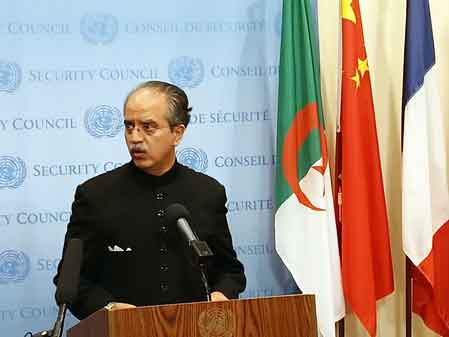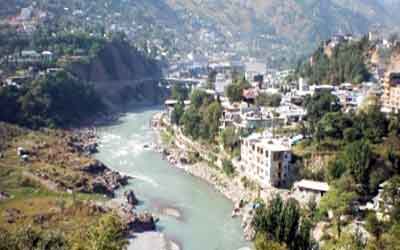While Kashmir has been called a "nuclear flashpoint", Pakistan's Permanent Representative to the United Nations Asim Iftikhar Ahmad has said that "we should not contemplate a situation like that" as both Pakistan and India are responsible countries.
"Kashmir is often termed as a 'nuclear flash point' but I believe that, you know, Pakistan is a responsible nuclear weapon state. I assume that India also exhibits that same kind of responsibility, and we should not contemplate, you know, a situation that would move in that direction," he said on Friday.
However, he did not deny that Pakistan does not subscribe to a no-first-use nuclear policy.
Ahmad was asked several times during his news conference here about the nuclear factor in a confrontation between the two neighbours.
"Pakistan is a responsible member of the international community. (How) we are responding to this situation that has evolved is also reflective of a responsible member state," he said at first.
Asked again about the nuclear factor, he said that he "deliberately did not mention" it because both nations "exhibit the same kind of responsibility".
Pressed again over Islamabad's position on no-first-use of nuclear weapons, he evaded giving a straight answer.
"I mean, it is stated policy, I mean Pakistan's policy on nuclear disarmament and all the related issues are all in the public realm. It is very well known."
His reluctance is because Pakistan has not adopted the policy of not being the first to use a nuclear weapon -- a public position -- that gives it the option to use it first.
India, on the other hand, declared a no-first-use policy.
A reporter asked Ahmad about the situation on the western border with Afghanistan and the Balochistan conflict, and how they would affect a possible conflict with India.
He said, "I don't believe that that's going to have an impact in terms of our readiness and preparedness to counter anything that comes across the Line of Control in Kashmir."
"The Western borders are under total control," he said.
"There is some counterterrorism and enforcement operation and law enforcement operations that are going on there," he added.
Pakistan and Afghanistan forces have clashed repeatedly along their border, and Islamabad accuses Kabul of harbouring the Tehreek-i-Taliban Pakistan (TTP), which has carried out cross-border attacks.
In addition, Pakistan is facing an insurgency by Balochis seeking independence.
Ahmad denied that that there had been "dogfights" -- aerial combats -- which a reporter claimed had taken place.
"There were some reports about some podcopters or drones, you know, shot down or something," but no aerial combat, he said.
"If the situation deteriorates, and some, you know, some kind of 'kinetic action' comes into play, this kind of a situation, a scenario is very much possible," he added.





India and Angola expand energy partnership, sign key agreements to strengthen bilateral ties
India and Angola on Saturday signed several key agreements following the bilateral meeting between Prime Minister Narendra Modi and Angolan President Joao Manuel Goncalves Lourenco at the Hyderabad House in New Delhi.
Pakistan faces critical artillery shortage, can sustain war for just four days
Pakistan’s military readiness has come under severe scrutiny, with intelligence sources revealing that the country can sustain high-intensity combat operations for no more than four days.
Omar Abdullah meets PM Modi in aftermath of Pahalgam terror attack
Jammu and Kashmir Chief Minister Omar Abdullah on Saturday met Prime Minister Narendra Modi in New Delhi to discuss the security situation in the Union Territory in the aftermath of the Pahalgam terrorist attack in which 26 civilians, mostly tourists, were killed.
Pahalgam attack: India now suspends inbound mails and parcels from Pakistan
The Centre on Saturday announced to suspend exchange of inbound mails and parcels from Pakistan via air and surface routes, after banning all imports and barring Pakistani-flagged vessels from entering the ports earlier in the day.
Deeply worried about increasing Chinese influence on Pakistan: Former US NSA
NSA to the US President Donald Trump from 2018-2019, Bolton emphasised that the terror threat has returned to the region following the withdrawal of the US forces from Afghanistan, thus making sure that Washington remains "very interested" in Af-Pak for "eminently good reasons".
Pakistan unleashes trolls on JK-based Indian military officials, faces heat
Fanning war hysteria, Pakistan has unleashed its army of misinformation creators and ISI-linked trolls to push a narrative that top Indian military officers were penalised for alleged lapses leading to the Pahalgam terror strike – a charge emphatically denied by the establishment in New Delhi on Saturday.
Indus Treaty suspension: Pakistan should realise threatening neighbours does lead to consequences, says former US NSA
India's decision to put the 1960 Indus Waters Treaty (IWT) in abeyance after the April 22 Pahalgam terror attack should send a strong message to Pakistan that engaging in activities that threaten their neighbours does lead to consequences,
India has 'legitimate right' to act in self-defence against Pakistan: Former US NSA
John Bolton, the US National Security Advisor (NSA) to the US President Donald Trump from 2018-2019 and a former US Ambassador to the United Nations, has said that even though nobody wants to see a wider conflict in South Asia,